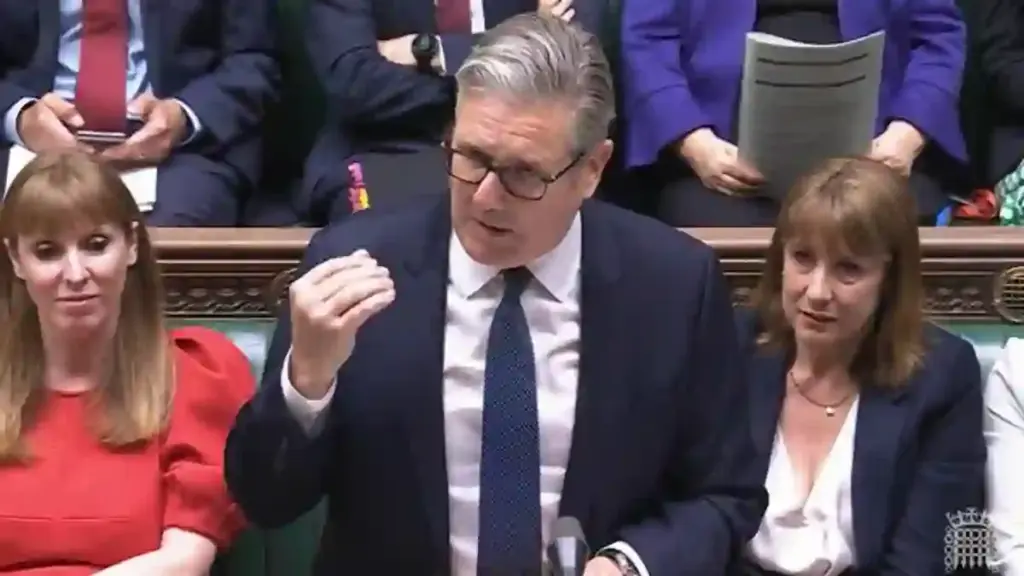Just a year after his big general election win, Keir Starmer is facing the kind of political headache no prime minister wants.
His authority has taken a hit after a dramatic retreat on key welfare reforms—and his critics, both inside and outside his party, are not holding back.
What was meant to be a cornerstone policy for reining in government spending has now crumbled under internal rebellion, putting Starmer on the defensive and sparking whispers about his future.
Starmer Faces a Brutal Backlash at PMQs
At Prime Minister’s Questions, Starmer was grilled hard by Kemi Badenoch, who didn’t hold back in pointing to what she called a string of “mistake after mistake.”
From the government’s position on grooming gangs to the handling of winter fuel allowance, she hammered home the message that Starmer is losing control.
To make things more awkward, Badenoch highlighted the grim expression of Chancellor Rachel Reeves seated beside Starmer, noting she “looked miserable”—a reflection, perhaps, of the deepening strain within the Cabinet.
The Benefits Reform That Backfired
Starmer’s original plan was to cut £5 billion annually from the benefits budget by the end of the current Parliament.
But after facing an internal revolt, he ditched the proposal—and now, instead of saving money, the plan will cost an extra £100 million.
Rebel MPs forced his hand, and the last-minute climbdown just 90 minutes before a key vote left the PM looking weak.
Cabinet Office Minister Pat McFadden admitted this move will have “financial consequences,” hinting that higher taxes might be on the table in the autumn budget.
Tax Hikes Now Loom as Labour Struggles With the Numbers
Rachel Reeves has vowed to stick to Labour’s manifesto promise of not raising income tax, National Insurance, or VAT.
But when pressed, she refused to guarantee that the freeze on tax thresholds wouldn’t be extended—a move that would effectively raise taxes for many.
The financial strain is clear, and rebels are now calling for alternative solutions, like a £24 billion wealth tax.
Rachael Maskell, who led the rebellion with her fatal amendment, said those with “broader shoulders” should bear the burden.
Angela Rayner Takes Center Stage Amid Leadership Chatter
Deputy Prime Minister Angela Rayner was credited with brokering the deal with rebels, and that’s only fueled speculation that she’s positioning herself to succeed Starmer.
Appearing on ITV’s Lorraine, she brushed off leadership rumours, joking, “It would age me by 10 years.”
When asked if Starmer looked tired, she admitted it’s a tough job: “There’s been a lot going on.
He’s been here, there, and everywhere, doing the job for Britain.”
Still, the cracks are showing, and within Labour, some are openly questioning whether Starmer will still be in No. 10 after Christmas.
Internal Truce Falls Apart Just Before Key Vote
What was supposed to be a show of unity turned into a collapse of discipline at Westminster.
The rebels weren’t buying the watered-down reforms, and when the vote came, 44 Labour MPs backed the amendment anyway. Even more abstained.
Despite the drama, the amendment was defeated 328 to 149, mostly thanks to Tories sitting it out.
The bill passed its second reading with 335 votes in favor and 260 against, but the rebellion had grown to 49 MPs by then—and more trouble may be ahead during committee scrutiny.
No Clear Plan for Saving Money
Adding to the confusion, Social Security Minister Stephen Timms couldn’t say how much the reworked policy would actually save.
When asked directly, he gave a vague answer: “The government will set out figures in the usual way.”
It left many MPs, and even some Cabinet members, baffled.
The revised plan will now cost more than the system it aimed to reform—at least until 2029.
Labour Rebels Call for Wealth Tax and Bigger Reforms
Rachael Maskell, speaking on BBC Radio 4, made her position clear: the solution isn’t to cut support for the poorest—it’s to ask the wealthiest to contribute more.
She floated proposals like equalizing capital gains tax or introducing a significant wealth tax to help balance the books.
She insisted that the public finances are a concern but said any changes should avoid “pushing down on the poorest.”
Starmer’s First Year Judged Harshly by Experts
Polling guru Professor Sir John Curtice didn’t sugarcoat it.
He told Times Radio that Starmer’s first year as Prime Minister has been one of the roughest starts for any new PM.
He added that the public still isn’t sure what Starmer really stands for.
That lack of clarity is becoming a problem, especially when combined with open rebellion from his MPs and questions over whether he can deliver on his economic promises.
Rayner Says She’s Not Eyeing the Top Job—But Keeps Spotlight
Pressed again on whether she sees herself in No. 10, Rayner firmly said no.
Her focus, she explained, is on improving lives through housing reform, better workers’ rights, and public service investment.
“I’m very interested in delivering for the people of this country,” she said.
“Being elected as an MP from my background was incredible… and being Deputy Prime Minister has to count for something.”
Still, in a party filled with ambition and tension, some see her as the natural successor if Starmer’s troubles continue.
The Full List of Labour Rebels
Here’s a full list of the 49 Labour MPs who voted against the bill, including well-known figures like Diane Abbott, Rebecca Long Bailey, Clive Lewis, and Stella Creasy.
Their defiance shows the scale of dissatisfaction within Labour—and the challenge Starmer now faces trying to hold his party together.

